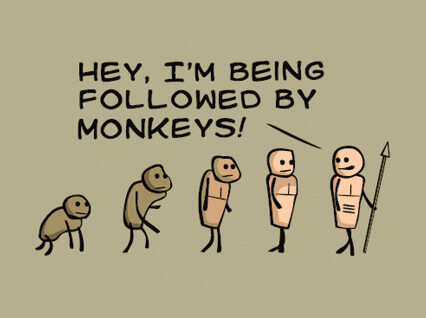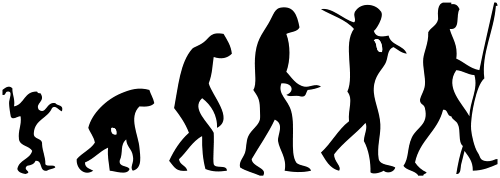
Evolution is, more often than not, perceived as a worldview. Shahd Al-Janabi explores the flaws to this approach and the misconceptions that abound as a result.
Creationists and other groups opposed to Evolution typically assume that proponents of the theory harbour particular views on the formation of the universe, the existence of God, abortion, euthanasia and other foundational topics.
Conceptualising Evolution as an all-encompassing life philosophy is, however, a purposeful and misleading strategy. It sets out to easily invalidate a concept that is obviously lacking as a worldview because it was never intended to be one – at least not by scientists.
If Evolution is not a worldview then what is it?
Quite simply, Evolution is a scientific theory that draws on biochemistry, genetics and biology to explain the mechanisms by which living organisms on Earth have changed throughout time. More specifically, it aims to address questions on how early life changed through descent into the forms we see today. Evolutionary theory is, therefore, no different to quantum theory, plate tectonics theory, atomic theory and all the other theories that attempt to account for observable phenomena in the natural world.
Unlike those theories, however, Evolution receives much attention – mostly of a negative nature – from the masses. The infamy is perhaps unsurprising given that the debate is plagued by many voices that use straw-man tactics to convince people that the theory is a (flawed) worldview.
Separating myth from fact
Misconception: Evolution is atheistic

The misconception that Evolution is ‘anti-God’ likely stems from people’s confusion on how to reconcile the notion of a purposeful God with evolution that is carried out solely by natural selection, speciation and modification.
It is important to recognise that although the theory of Evolution explains changes or diversification in life forms without involving God (much like the theory of gravity explains the motions of the planets without involving God), it does not intend to prove the absence of a divine, metaphysical entity – nor can it. Indeed, it can be said that Evolution is atheistic in the sense that all science is atheistic or naturalistic – that is, it operates as if a divine entity does not exist.
However, it is important to understand that this assumption is made when conducting scientific research not because researchers are philosophical naturalists (atheists), but because the influence of a metaphysical entity on nature is untestable. Thus, the purpose of Evolutionary theory is to inform us about the workings of nature (through observation) not what God did or did not do.
Misconception: Evolution is just a theory

United States Republican State Senator Mike Fair recently said, “I don’t have a problem with teaching theories. I don’t think it [Evolution] should be taught as fact”. This statement demonstrates a great misunderstanding about the definition of the term ‘theory’ within a scientific context.
Theories tie together findings about a particular phenomenon and provide an explanation that accounts for those findings. As such, in science, a theory is the best approximation of truth that is possible at that time. It is important to note that a theory, once its predictions are tested and evidence is accumulated in its favour, does not become a law. A law, unlike a theory, is used to describe observations. For example, the law of gravity is used to describe the phenomenon where an object, when thrown in the air, will come down. The theory of gravity, on the other hand, explains the reasons for which that very object came down. If there were a hierarchy, theory would trump law.
Consequently, stay away from arguments that use the “it’s just a theory” line to dismiss Evolution. Such a line is misleading because it suggests that Evolution (and the theory of gravity!) is unsubstantiated, pure conjecture when, actually, theory is based on fact.
Misconception: Humans evolved from monkeys
Evolutionary theory does not imply that humans evolved from monkeys. Evolutionary theory does, however, state that humans share a common ancestor with apes and monkeys (dating approximately 5 million and 50 million years ago respectively) because of similarities in DNA sequences. For instance, humans have a 99% genetic similarity to chimpanzees.
The common ancestor is neither human nor ape. Other species also evolved from it, such as Homo habilis, Homo erectus and Homo neanderthalensis. Those species later became extinct, however, leaving humans to share the earth with other primates like bonobos and chimps.

Image: M. Garde
In fact, whilst this may come as a shock to many, Zallinger’s ‘March of Progress’ illustration (depicted above) is unrelated to Evolution. Moreover, it is a misleading diagram because it incorrectly implies that Evolution is linear and moves towards an ‘ideal’ form: from monkeys to humans.
Misconception: No one has seen Evolution, so it doesn’t exist

This misconception is based on the outdated notion that speciation (the process by which new species form) occurs so slowly that we cannot observe it occurring in real-time. Recent research indicates, however, that we do not need to track a population for several millennia in order to observe speciation. In fact, the evolution of a species can be observed in real-time particularly amongst organisms with short reproductive cycles that are exposed to extreme environmental demands. Examples of these include Central European Blackcaps, Galapagos Finches, Peppered Moths, E-Coli and Italian Wall Lizards.
Nevertheless, even without these direct observations it would be wrong to claim that not witnessing Evolution explains its lack of existence because evidence is not limited to real-time observations. Evolutionary theory makes predictions about what scientists would expect to observe in fossil record, genetic sequences or comparative anatomy and these predictions have been replicated and validated numerous times.
Misconception: Evolution is random

“Either evolution is true or creationism is. If evolution is true, then we all got here by random chance. I just can’t believe that; there’s too much order, complexity and beauty in this world for it all to be the result of chance. Therefore, creationism must be true.”
Chance does play a role in Evolution. A population may, for instance, randomly experience a genetic mutation. However, the subsequent process of evolution is not random.
Mutations, which provide genetic variation, are purposely sorted out by natural selection. Those that give greater fitness for reproductive success to their possessors are retained in the population through descent, whereas less successful mutations are not retained in the population so that they don’t disrupt the accrual of beneficial mutations.
Environmental demands determine which mutations are filtered out or preserved. Natural selection consequently ensures that populations continue to move towards greater fitness rather than moving back and forth between greater and lesser fitness, which is what would happen if the process of Evolution were truly random.
Ultimately, there are many more myths about Evolution than can be discussed in one sitting.
Why should we care?
Understanding evolution outside of the restrictive realms of its perception as a worldview can aid in solving biological problems that impact our day-to-day lives, such as controlling hereditary diseases. However, as a society, we will not be able to take full advantage of Evolutionary theory if public opinion remains negative because, frankly, public opinion informs public policy.
The scientific community is by and large in agreement about Evolution. By taking a non-controversy and framing it as a controversy we endanger the place of science in education. One example is the bill to make science education optional in Missouri, USA.
So let’s not cast aside Evolution. It may not be a theory of everything, but it is a theory about how we came to be in our current anatomical and physiological form.
What can be more useful than that?
Categories: Religion and Culture

